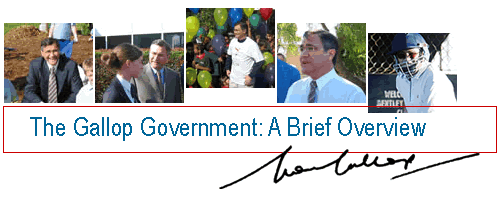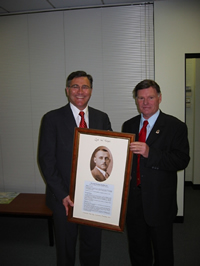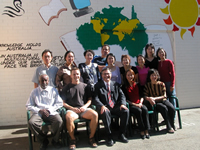
The Gallop Labor Government came to power in February 2001 eight years after the defeat of the Lawrence Government in 1993. In the Legislative Assembly the ALP won 32 of the 57 seats, an increase of 13 on its 1996 figure, and this despite an election in which the total support for the major parties amounted to barely 70 per cent of the first preference votes. The Government's position in the Legislative Council was also relatively favourable with 13 Labor members and 5 Greens between them providing a majority of the membership in the 34 member chamber.
Four years later the government was returned to power again with 32 members in the Legislative Assembly and an even stronger Upper House membership with 16 ALP members and 2 Greens. In the Legislative Assembly the ALP share of the primary vote rose to 41.9 per cent compared with 37.2 per cent in 2001.
However, in January 2006, less than twelve months into the Government's second term .Gallop resigned as Premier and MLA for Victoria Park as a consequence of ill health and was succeeded by his State development minister Alan Carpenter. The new administration saw out most of the remainder of the four year term but lost office narrowly in September 2008.
During the five year Gallop administration there was a high degree of stability among the senior ministers. Eric Ripper was Gallop's Deputy and Treasurer for the whole five years and Kim Chance his senior Legislative Council and Agriculture Minister. From February 2001 throughout the term of the Gallop Government (and also the Carpenter ministry) Alannah MacTiernan was Minister for Planning and Infrastructure while Jim McGinty was Attorney General and Minister for Electoral Affairs as well as taking over the Health portfolio in June 2003. Another senior minister John Kobelke was Minister for Consumer and Employment Protection throughout and Indigenous Affairs from June 2003. Gallop's successor Alan Carpenter was Education Minister from 2001 to March 2005 as well as other portfolios before (with the retirement of Clive Brown) taking over State Development and Energy in March 2005.
At the time the Gallop Government came to power Western Australia's economy was relatively sluggish and the state debt increasing. Within twelve months, however, the rapidly improving international terms of trade in response to a sharp rise in commodity prices, and the growth of the Chinese economy, set the State's economy on an upward path which ran for six more years until the financial crisis of October 2008.
Thus the Gallop Government presided over a period in which revenue increased rapidly as did expectations from the community, in terms of demands for improved health and education services, tax reductions and protection against the rapidly rising cost of land and housing.
The Premier himself gave strong support to the boom while insisting on a strong environmental focus which included an immediate embargo on logging in old growth forests and the veto of proposed tourist developments which would impact on the Ningaloo coast.
The approach of the Gallop Government to environmental issues is explored further using Ningaloo as a case study in Environmental Issues: Carnarvon-Ningaloo Coast.
More broadly a Sustainability Unit was established within the Premiers Department to deal with such issues as deliberative democracy as well as strictly environmental concerns.
On the constitutional front the government's greatest achievement in its own eyes was the reform of the malapportioned electoral system for the Legislative Assembly but vote weighting was retained for Legislative Council elections.
 Curtin University Library. Geoff Gallop Collection. Records of Geoff Gallop. Geoff Gallop presenting a portrait to RSL committee member, 2004. GG00020/48.
Curtin University Library. Geoff Gallop Collection. Records of Geoff Gallop. Geoff Gallop presenting a portrait to RSL committee member, 2004. GG00020/48.
 Curtin University Library. Geoff Gallop Collection. Records of Geoff Gallop. Geoff Gallop Swan TAFE Carlisle campus, 2004. GG00020/56.
Curtin University Library. Geoff Gallop Collection. Records of Geoff Gallop. Geoff Gallop Swan TAFE Carlisle campus, 2004. GG00020/56.


